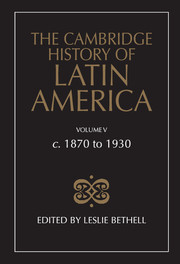Book contents
- Frontmatter
- PART ONE MEXICO
- PART TWO CENTRAL AMERICA AND THE CARIBBEAN
- PART THREE THE RIVER PLATE REPUBLICS
- PART FOUR THE ANDEAN REPUBLICSo
- PART FIVE BRAZIL
- 19 The Brazilian economy, 1870–1930
- 20 Brazil: the age of reform, 1870–1889
- 21 Brazil: the social and political structure of the First Republic, 1889–1930
- Bibliographical essays
- References
20 - Brazil: the age of reform, 1870–1889
from PART FIVE - BRAZIL
Published online by Cambridge University Press: 28 March 2008
- Frontmatter
- PART ONE MEXICO
- PART TWO CENTRAL AMERICA AND THE CARIBBEAN
- PART THREE THE RIVER PLATE REPUBLICS
- PART FOUR THE ANDEAN REPUBLICSo
- PART FIVE BRAZIL
- 19 The Brazilian economy, 1870–1930
- 20 Brazil: the age of reform, 1870–1889
- 21 Brazil: the social and political structure of the First Republic, 1889–1930
- Bibliographical essays
- References
Summary
In Brazil, as in many other Latin American countries, the 1870s and 1880s were a period of reform and commitment to change. Intellectuals, professional men, military officers – urban people though often with rural roots – joined associations for the abolition of slavery and organizations for the promotion of mass European immigration, campaigned in favour of federalism and provincial autonomy, argued for the separation of church and state, participated in campaigns for electoral reform, and supported the Republican party. Nor were representatives of the agrarian and mercantile dominant class, known for its conservatism, completely immune to progressive ideas. In the decade before 1870 staunch members of the Conservative party had broken away from their traditional loyalties and joined the Liberal party, while many devoted Liberals left their party to create the Republican party in 1870. Intellectuals also criticized traditional philosophy, condemned romantic literary conventions, and ridiculed the system of education; they cultivated positivist and evolutionist ideas, adopted new forms of expression, and proposed a new system of education more orientated towards science and technology; they repudiated what they perceived as empty liberal rhetoric, criticized the ruling classes, and made ‘the people’ their subject matter.
By the beginning of the 1890s, reformers could pride themselves on having achieved many of their aims. An electoral reform had been implemented in 1881. Parliament had abolished slavery in 1888. Large numbers of European immigrants had begun to enter the country. And in 1889, a military coup had overthrown the monarchy. The new republican regime adopted a federal system and extended the suffrage.
- Type
- Chapter
- Information
- The Cambridge History of Latin America , pp. 725 - 778Publisher: Cambridge University PressPrint publication year: 1986
References
- 19
- Cited by

